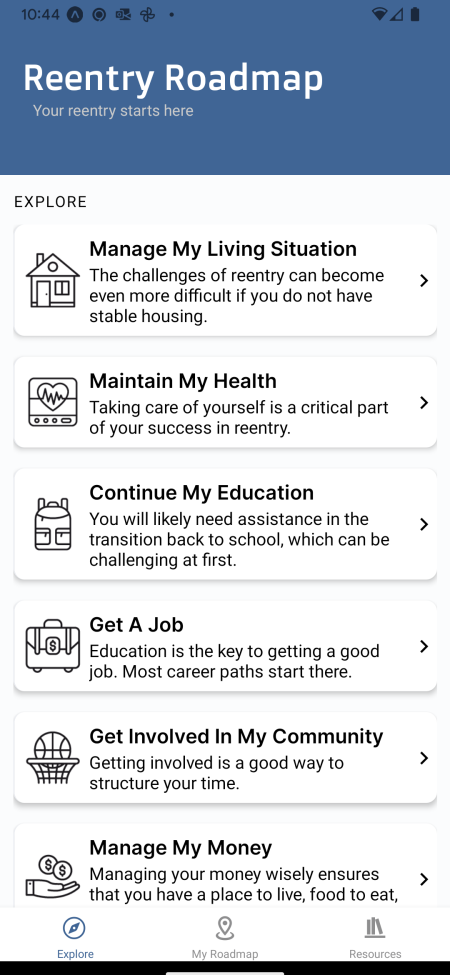Making Reentry Successful
As many as seven out of every 10 young people who leave the juvenile justice system are arrested, recommitted to juvenile facilities or sent to an adult prison or jail. Meanwhile, research aimed at integrating youth development has shown positive outcomes for young people exiting the system. We offer three research-based resources to help agencies provide young people with real second chances for successful reentry.
Youth Reentry Survey
The only way to really know if young people are prepared and ready for reentry is to ask them. We provide a reentry survey to understand each young person’s perceptions of their experiences, skills, opportunities, connections and beliefs. As part of the Reentry Standards project, we developed a reentry survey that integrates findings from positive youth development research. The survey is designed for young people who are exiting residential placements and community supervision and is typically completed on a handheld kiosk.
Reentry Data Capacity
In 2018, OJJDP awarded funding to our training and technical assistance team to help agencies implement the Reentry Standards and increase the capability of collecting, reporting and utilizing data to improve reentry outcomes. OJJDP recognized the challenges facing systems in collecting reentry data from programs and services spanning different agencies and locations. Current funding is supporting intensive technical assistance in four selected jurisdictions as well as the development of public webinars, resources and tools.
Reentry Standards
From 2015-2019, we developed national standards and measures to help the field have a more comprehensive understanding of reentry services and programs for young people. The project, funded by the Office of Juvenile Justice and Delinquency Prevention, Office of Justice Programs, US Department of Justice (OJJDP), created reentry standards and measures grounded in research and practice, providing a framework of best practices and comprehensive tools for ongoing data measurement.


CREATED IN PARTNERSHIP WITH OJJDP
Reentry App
When young people are released after living 24/7 in a secure facility or residential program, they need to find a safe and stable place to live, a job, a way to pay for and get food and avoid old habits. It's stressful, confusing and full of barriers that result in as many as seven out of 10 returning the facility. We are building a mobile application to help with that transition time - called reentry. It will put resources directly into their hands such as links to website for shelters and food pantries, job postings, child care and more. It will be available at the end of 2024.
